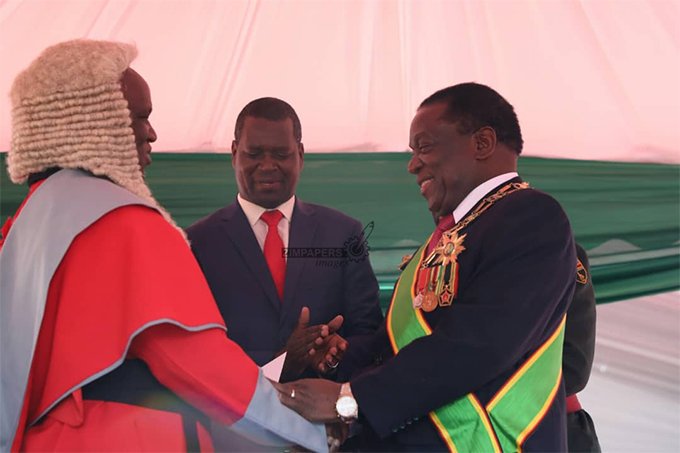By Chigumbu Warikandwa
Zimbabwe has seen a new government work ethic since 2017. Most visible is the fight against public sector corruption. Public sector corruption had reached endemic proportions and with impunity. Zimbabwe had not known the arrest of any sitting government minister until Priscah Mupfumira. Allegations of top government office corruption had been spoken of in hushed voices, in fact it was taboo to speak ill of a corrupt government official without the risk of arrest or some unwanted action against such a speaker.
A government that wields a no-nonsense approach to corruption will naturally weed out the vice yet at the same time reducing the speed of its occurrence among unrepentant dare-devils. It takes two or more to perform public sector corruption. If deterrent mechanisms are thrown on the way, a corrupt deal requiring seven conspirators may fail to convince three important people in the chain to conspire on it.
President Mnangagwa’s New Dispensation has introduced the most interactive government ever. Some people did not know that cabinet sits every Tuesday until recently. The Cabinet Decision Matrix media briefing is the most media friendly government gathering ever where all manner of questions are entertained so the public is fully informed. Transparent leadership is leadership for the people. No follower can follow a leader whose leadership tenets are shrouded in secrecy and opaqueness.
Besides, the government’s internet footprint has never been as ubiquitous as it is today. It doesn’t end there; it has cultivated itself well into the trenches of social media where citizens can communicate with government in real time. Gone are the days when government correspondence would reach the inquirer long after his death. Minister Monica Mutsvangwa’s Information Ministry has not slept on its job insofar as social media interaction is concerned. The ministry’s cyber-performance has encouraged other prominent government officials to embrace the technology change, with unlikely and seemingly die hard laggards eventually appearing on such techno savvy cites like Instagram and Twitter.
Today, every government department has some social media mouthpiece in the form of permanent secretaries, ministers, directors and public relations officers. And the big one; the President himself is on both Twitter and Facebook. On his twitter page on 21 August 2019, the president @edmnangagwa wrote “The twin evils of corruption & inefficiency must be eradicated. Agencies like the Public Service Commission & the ZACC are making this fight essential part of their strategic plans. We will fight and defeat corruption wherever it rears its ugly head.” He is not ending his corruption fight on Twitter. He has put up a hand to stop the vice.
The real time interactions between the presidency and the citizenry have brought in a new aura of comradeship between the leader and his 900000 followers straddling the Facebook and Twitter expanses.
Social media is not without its negatives. The newfound power of anonymity and physical elusiveness has empowered the citizenry to ask question traditionally thought to be taboo. Some have gone further in abusing the same freedoms, attacking persons instead of ideas, abusing the public officials, denigrating their persons, even from a private life perspective. Some unruly elements treading on social media have even gone all the way to insult, demean and spread falsehoods. But, within the chaff, the presidency is picking few lost grains and pocketing them. And, none of the social media trolls have been arrested. Talk of freedom!
Never has government been accused and gone all the way to instituting inquiries into the same. The Motlanthe Commission comes into mind. Zimbabwe had not been known to respond to accusations on the State, the New Dispensation has brought this new development into the governance perspective.
A bureaucracy whose foot soldiers know that the citizen has the right to question government actions expecting answers out of it will deliver polished service, which is what is currently happening.
The capital city, Harare, had been characterised by bad roads, including in the CBD. The New Dispensation has sealed these tearing roads to perfection. Resources allowing, it has the potential to polish all the national roads to perfection.
The New Dispensation has carried on its back the famed devolution provided for in the 2013 constitution but remained parked for unknown reasons. It has operationalized this important piece of localized development matrix. This would see more people’s ideas being embraced in the development agenda. Power is no longer a private commodity. If anything, the New Dispensation has put governance ideas on the National Ideas Stock Exchange for public input, weaker ideas crumbling from the pressure of superior ones.
Away from the presidency, we have seen a very visible national actor in the face of the First Lady, Amai Auxillia Mnangagwa who has straddled the country and beyond in pursuit of the Zimbabwean cause, more so women’s, children’s and downtrodden people’s causes. Zimbabwe will never be the same again given the new leadership ethic set down by the New Dispensation. Whoever shall lead it in the remote future shall follow a strict work schedule designed by this new era of governance.
The energetic charity and philanthropic works of the First Lady are clear to an observant eye that she often sleeps away from home in her whirlwind national tours. Long live the New Dispensation. Long Live Zimbabwe!




